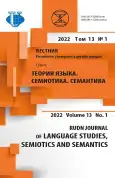“Language Keys”: Foreign Cultural Lexicon in the Translingual (Russophonic) Literary Text
- Authors: Bakhtikireeva U.M.1, Valikova O.A.1
-
Affiliations:
- Peoples’ Friendship University of Russia (RUDN University)
- Issue: Vol 13, No 1 (2022)
- Pages: 184-200
- Section: LINGUISTICS OF THE TEXT
- URL: https://journal-vniispk.ru/2313-2299/article/view/323324
- DOI: https://doi.org/10.22363/2313-2299-2022-13-1-184-200
- ID: 323324
Cite item
Abstract
The authors of the article consider the translingual (more broadly, transcultural) literary text as a “meeting place for languages and cultures”, which results in the formation of a new horizon for understanding aesthetic reality. Translingualism as the practice of artistic creation in a language that is not ethnically primary for the author implies the retranslation of ethnospecific images that are basic for the original linguistic culture through an intermediary language (in our case, Russian). Words with a national-cultural component of semantics that are not equivalent for the Russian language system cannot be attributed to borrowings, since a bilingual author produces, in the strict sense, the transfer (transfer) of a communicative-cognitive phenomenon from one language system to another. In this case, the incorporated elements perform a number of ontically significant functions, since they participate in the plot construction of a work of art, appeal to the archetypal substrate of an ethnos, carry a symbolic load and participate in the formation of a new - more complex - aesthetics. The authors comprehend the phenomenon of translinguism in the post-Soviet space and illustrate the mechanisms of functioning of foreign cultural elements of a Russophonic literary text based on the poem by A. Kodar “On this day that fell into paganism.”
About the authors
Uldanai M. Bakhtikireeva
Peoples’ Friendship University of Russia (RUDN University)
Author for correspondence.
Email: uldanai@mail.ru
Doctor of Philology, Professor, Professor of the Department of Russian Language and Intercultural Communication 6, Miklukho-Maklaya str., Moscow, Russian Federation, 117198
Olga A. Valikova
Peoples’ Friendship University of Russia (RUDN University)
Email: leka.valikova@mail.ru
PhD in Philology, Associate Professor of the Department of Russian Language and Intercultural Communication 6, Miklukho-Maklaya str., Moscow, Russian Federation, 117198
References
- Tlostanova, M.V. (2004). Never live, write from nowhere. Post-Soviet literature and the aesthetics of transculturation. Moscow: URSS. (In Russ.).
- Ortiz, F. (1995). Cuban Counterpoint: Tobacco and Sugar. New York: Knopf, 1947. Reprint: Durham, NC, and London: Duke University Press Books.
- Proshina, Z.G. (2016). Problems and prospects of translingual and transcultural contacts. Social and Human Sciences in the Far East, 2(50), 6—9. (In Russ.).
- Tlostanova, M.V. (2006). Transculturation as a new episteme of the era of globalization. RUDN Journal of Philosophy, 2, 5—16. URL: https://cyberleninka.ru/article/n/transkulturatsiya-kak-novaya-epistema-epohi-globalizatsii (accessed: 18.05.2021). (In Russ.).
- Canagaraja, S. (2016). Multilingual pedagogy of the neoliberal time: clearing the territory and planning for movement forward. Social and Human Sciences in the Far East, 2(50), 10—21. (In Russ.).
- Humboldt, V. (1985). Language and philosophy of culture. Moscow: Progress. pp. 370—382. (In Russ.).
- Garcia, O. & Wei, L. (2014). Translanguaging: Language, Bilingualism and Education. New York: Palgrave Macmillan.
- Novikov, L.A. (2007). Literary text and its analysis. Moscow: LKI Publishing House. (In Russ.).
- Ilyin, I.A. (1993). The path of spiritual renewal in the path to evidence. Moscow: Institut russkoj tsivilizatsii Publ. pp. 134—289. (In Russ.).
- Bakhtikireeva, U.M. Transfer. URL: https://magazines.gorky.media/druzhba/2009/12/transfer-transfer.html (accessed: 05.18.2021). (In Russ.).
- Alefirenko, N.F., Nurtazina, M.B. & Shakhputova, Z.K. (2021). Autochthonous synergy of Russian literary discourse. Russian Language Studies, 19(3), 253—270. https://doi.org/10.22363/2618-8163-2021-19-3-253-270 (In Russ.).
- Vezhbitskaya, A. (2011). Semantic universals and basic concepts. Moscow: Languages of Slavic Cultures. (In Russ.).
- Ingarden, R. (1962). Research in aesthetics. Moscow: Publishing house of foreign literature. (In Russ.).
- Husserl, E. (2015). Ideas for pure phenomenology and phenomenological philosophy. Moscow: Akademicheskiy proyekt publ. (In Russ.).
- Hadamer, H.G. (1991). About the circle of understanding. Relevance of the beautiful. Moscow: Isskustvo publ. pp. 72—91. (In Russ.).
- Karasev, L.V. (2005). Ontological poetics (short essay). In: Aesthetics: Yesterday. Today. Always. Issue 1. Moscow: IF RAS. pp. 91—113. (In Russ.).
- Bakhtikireeva, U.M. (1995). Artistic functions of vocabulary with a national-cultural component of semantics in the novel by Ch. Aitmatov “And the day lasts longer than a century” [dissertation]. Moscow: RUDN. (In Russ.).
- Bakhtikireeva, U.M. (2009). Creative bilingual personality (features of the Russian text of the author of Turkic origin). Astana: CBO and MI publ. (In Russ.).
- Novikov, L.A. (2001). Selected Works. Vol. II: Aesthetic aspects of language. Miscellanea. Moscow: RUDN. pp. 554—570. (In Russ.).
Supplementary files









